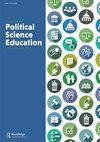多样性和脱节:网络环境是否影响学生对特权、压迫和白人内疚的理解?
IF 0.6
Q3 POLITICAL SCIENCE
引用次数: 0
摘要
教育者是否应该以在线形式教授多样性课程?涉及性别歧视、种族主义、种族中心主义或同性恋恐惧症的课程越来越多地成为大学生课程要求的一部分。本研究比较了作者的《政治学的多样性》导论课程的六个部分的学生调查;其中三个部分是在线异步教学,另外三个部分是面对面教学。结果显示,在线和面对面的学生对特权和压迫、归属感或白人内疚的理解没有差异。然而,尽管所有共和党学生都通过这门课程加深了他们对特权和压迫的理解,但与在线学生相比,共和党学生进入这门课程时对压迫的了解更少,并且经历了更多的成长。党派关系的重要性表明,在确定在线多样性课程的可传播性方面,以学生为中心的方法是有价值的,并为在线和面对面空间中的政治学多样性课程的成功模式提供了证据。本文章由计算机程序翻译,如有差异,请以英文原文为准。
Diversity and Disconnection: Does an Online Setting Affect Student’s Understanding of Privilege, Oppression, and White Guilt?
Should educators teach diversity courses in online formats? Courses covering sexism, racism, ethnocentrism, or homophobia are increasingly part of the curriculum requirements for college students. This study compares student surveys from six sections of the author’s introductory Diversity in Politics course; three of these sections are taught asynchronously online, and three are taught in a face-to-face setting. Results reveal no difference between online and face-to-face students’ understandings of privilege and oppression, sense of belonging, or white guilt. However, although all Republican students increased their understanding of privilege and oppression from this course, Republican students uniquely entered the course with less knowledge of oppression and experienced increased growth compared to their online counterparts. The importance of partisanship suggests a more student-centered approach can be valuable in determining the transmissibility of online diversity courses and provides evidence for a successful model for political science diversity courses in online and in-person spaces.
求助全文
通过发布文献求助,成功后即可免费获取论文全文。
去求助
来源期刊

Journal of Political Science Education
POLITICAL SCIENCE-
CiteScore
1.80
自引率
36.40%
发文量
69
期刊介绍:
The Journal of Political Science Education is an intellectually rigorous, path-breaking, agenda-setting journal that publishes the highest quality scholarship on teaching and pedagogical issues in political science. The journal aims to represent the full range of questions, issues and approaches regarding political science education, including teaching-related issues, methods and techniques, learning/teaching activities and devices, educational assessment in political science, graduate education, and curriculum development. In particular, the journal''s Editors welcome studies that reflect the scholarship of teaching and learning, or works that would be informative and/or of practical use to the readers of the Journal of Political Science Education , and address topics in an empirical way, making use of the techniques that political scientists use in their own substantive research.
 求助内容:
求助内容: 应助结果提醒方式:
应助结果提醒方式:


